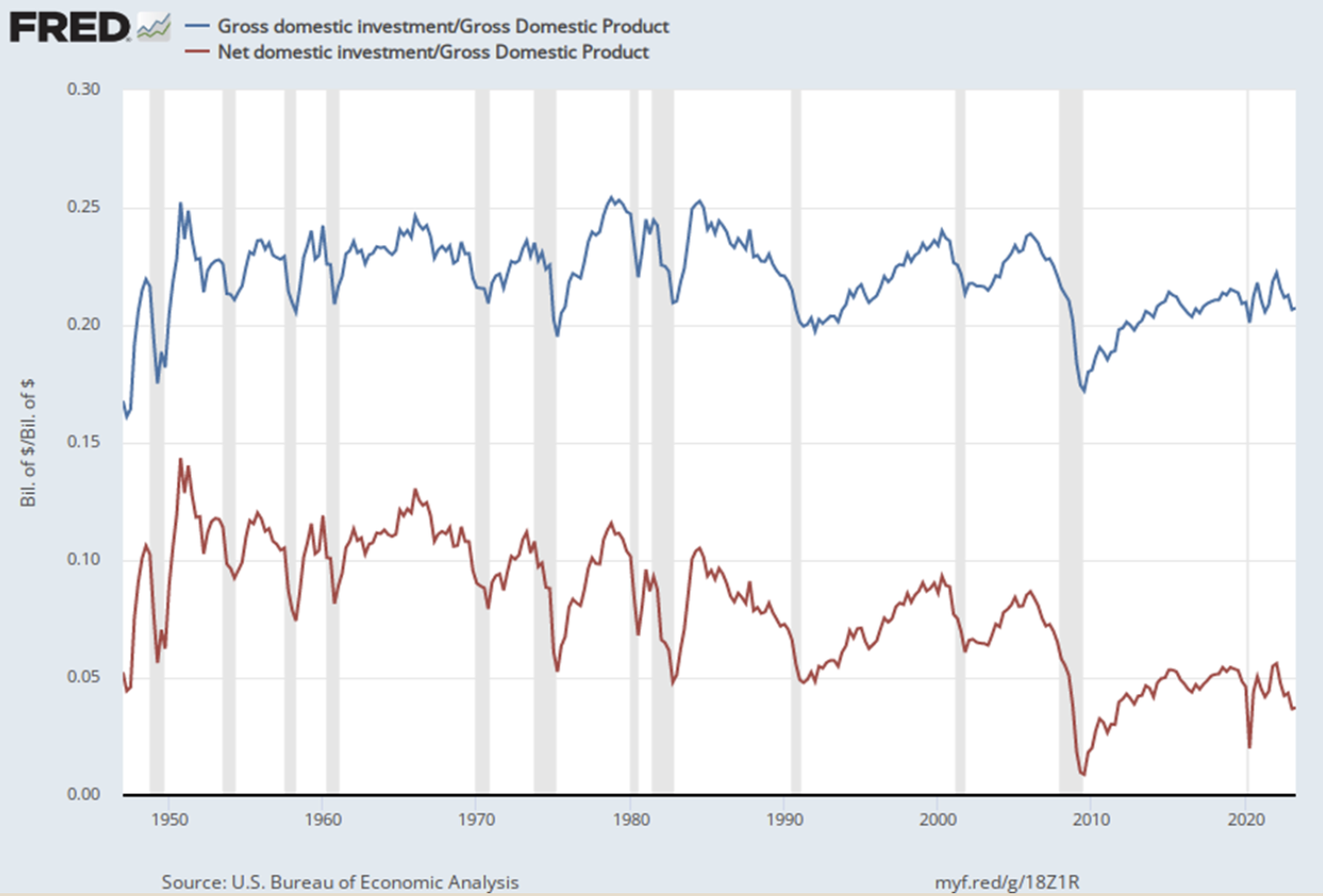Comments
- No comments found

Gross investment refers to the total amount invested. However, in any given year, part of gross investment just goes to replace capital that has depreciated and worn out.
Thus, the US Bureau of Economic Analysis also calculated net investment, which is the addition to the overall US capital stock after taking replacement of depreciated capital into account. What’s interesting, and disturbing, is that the gap between gross and net investment is rising.
Here’s a figure showing the patterns for the US economy. Gross investment has typically been 20-25% of GDP over time, although in recent years it’s been closer to the lower end of that range. From the 195os up into the 1980s, net investment was (very roughly) 10% of GDP. Thus, it was plausible to say that in a typical year, a little more than half of gross investment went to replace capital that was wearing out, and a little less than half of gross investment was actually new, net investment growing the capital stock.
But in the last decade or so, gross investment has been about 20% of GDP, and net investment has fallen to about 5% of GDP. In other words, gross investment as a share of GDP has fallen a bit, but not too much. The real change is that about three-quarters of investment is now going to replace capital that has worn out, so net investment is much lower.

What’s going on here, as I understand it, is that the life expectancy of capital investment has been declining. If a firm bought a large piece of physical equipment for a factory back in the 1960s or 1970s, it was probably hoping to get at least 10 or 20 years of use from that investment. But if a modern firm makes a major investment in new computers, databases, and software, that investment will depreciate over a much shorter time period.
In short, it’s not just how much an economy invests in capital equipment, but also how long that equipment can reasonably be expected to last. The data shows that the typical US capital investment, with its greater emphasis on rapidly evolving information technology, is depreciating faster than it used to.
Timothy Taylor is an American economist. He is managing editor of the Journal of Economic Perspectives, a quarterly academic journal produced at Macalester College and published by the American Economic Association. Taylor received his Bachelor of Arts degree from Haverford College and a master's degree in economics from Stanford University. At Stanford, he was winner of the award for excellent teaching in a large class (more than 30 students) given by the Associated Students of Stanford University. At Minnesota, he was named a Distinguished Lecturer by the Department of Economics and voted Teacher of the Year by the master's degree students at the Hubert H. Humphrey Institute of Public Affairs. Taylor has been a guest speaker for groups of teachers of high school economics, visiting diplomats from eastern Europe, talk-radio shows, and community groups. From 1989 to 1997, Professor Taylor wrote an economics opinion column for the San Jose Mercury-News. He has published multiple lectures on economics through The Teaching Company. With Rudolph Penner and Isabel Sawhill, he is co-author of Updating America's Social Contract (2000), whose first chapter provided an early radical centrist perspective, "An Agenda for the Radical Middle". Taylor is also the author of The Instant Economist: Everything You Need to Know About How the Economy Works, published by the Penguin Group in 2012. The fourth edition of Taylor's Principles of Economics textbook was published by Textbook Media in 2017.
Leave your comments
Post comment as a guest